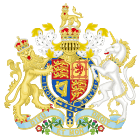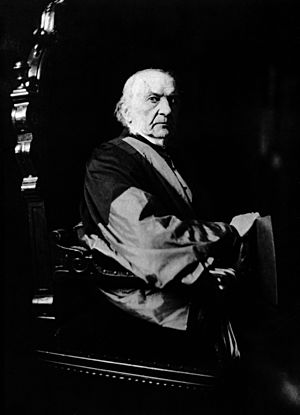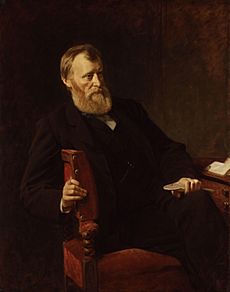Protection of Persons and Property (Ireland) Act 1881 facts for kids

|
|
| Long title | An Act for the better Protection of Person and Property in Ireland. |
|---|---|
| Introduced by | William Ewart Gladstone, Prime Minister, 24 January 1881 |
| Territorial extent | Kingdom of Ireland |
Quick facts for kids Dates |
|
| Royal Assent | 2 March 1881 |
| Repeal date | 25 August 1894 |
| Other legislation | |
| Repealing legislation | Statute Law Revision Act 1894 |
| Status: | |

The Protection of Persons and Property (Ireland) Act, also called the Coercion Act, was an act of the Parliament of the United Kingdom which allowed for internment without trial of those suspected of involvement in the Land War in Ireland. The provisions could be introduced by proclamation of the Lord Lieutenant of Ireland in any area of the island. Lists of internees had to be laid before Parliament.
Enactment
The 1881 act was one of more than 100 Coercion Acts applied to Ireland under the Union. W. E. Gladstone was returned to office in 1880, during the agrarian violence and civil disturbance of the Land War in Ireland. William Edward Forster was made Chief Secretary for Ireland. He carried the Compensation for Disturbance Bill through the Commons, only to see it thrown out in the Lords. On 24 January 1881, he introduced a new Coercion Bill in the Commons.
The bill was strongly opposed by the Irish Parliamentary Party (IPP), which took its obstructionism tactic to new heights by filibustering the second reading for 41 hours. Eventually the Speaker resorted to ignoring IPP MPs requesting the right of speech and put the question. This controversial unprecedented move was soon formalised when Gladstone secured an amendment of the rules of order to allow for cloture ("guillotine") motions. After the bill became law in March, The Spectator commented that it had "virtually occupied the whole time of the Lower House for seven weeks and a day; for though some part of the discussion was nominally devoted to the Queen's Speech, even that debate hardly turned upon any other subject."
Implementation
A total of 953 people were detained under the act. Many of them were active in the Irish National Land League; this was sufficient for the "reasonable suspicion" required by the act. On 13 October 1881, IPP leader Charles Stewart Parnell was arrested under the act after his newspaper, the United Ireland, had attacked the Land Law (Ireland) Act 1881. The arrest warrant accused Parnell of acting as principal in inciting others to "abstain from...pay[ing] rents lawfully due". He was interned in Kilmainham Gaol. United Ireland published a No Rent Manifesto the week after Parnell's imprisonment, and the Land League was banned, only to reappear as the Irish National League. Detention of Irish Americans with U.S. citizenship caused a diplomatic row between London and Washington.
Ending
The act was due to expire 30 September 1882. A bill to repeal it was defeated on first reading in February 1882, having been introduced by Thomas Sexton, a signatory of the No Rent Manifesto. Forster proposed renewing the act indefinitely to deal with the crisis, but the rest of the government disagreed, and negotiations began with Parnell. These lead to the "Kilmainham Treaty", which ended boycotting such that the act was allowed to expire. Both Forster and the Lord Lieutenant, John Spencer, 5th Earl Spencer, resigned in May 1882.
The act was repealed by the Statute Law Revision Act 1894.
Influence on William Morris
The Irish Coercion Act was important in the political development of William Morris. Up to 1881 Morris considered himself a Liberal and was the treasurer of the National Liberal League, but the Coercion Act made him irrevocably break with the Liberal Party, having come to regard its name as "only a label". This was a decisive moment in Morris' leftward development, culminating in declaring himself a Revolutionary Socialist some years later.


